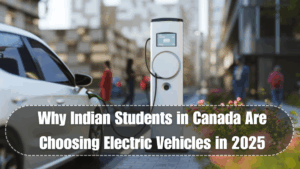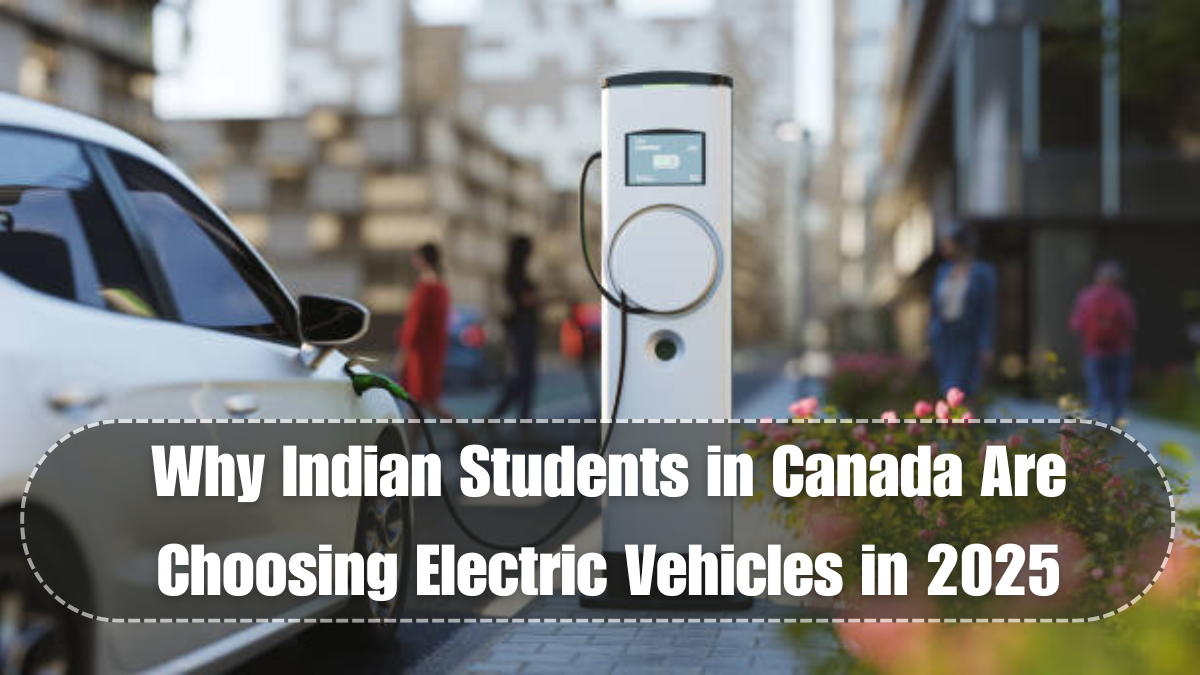A new Universal Immigration report highlights a sharp rise in EV adoption in Canada for students, particularly among Indian international students seeking affordable and sustainable transport solutions. In 2025, electric vehicles (EVs) are emerging as a smart choice for managing costs, complying with green regulations, and benefiting from government incentives.
Whether used for campus commutes, part-time job travel, or weekend trips, electric vehicles offer an attractive alternative to fuel-based cars. The shift toward green driving is being driven by tax rebates, lower maintenance costs, and eco-conscious lifestyle choices that align with global sustainability goals.

Why Indian students prefer EV Canada options
The number of Indian students choosing EV Canada models has increased due to multiple financial and practical advantages. Rising fuel prices, stricter emission laws in provinces like British Columbia and Ontario, and the availability of small, city-friendly EVs have influenced this trend.
Key reasons behind the preference:
-
Access to federal and provincial EV rebates (up to CAD $5,000)
-
Exemption from certain registration fees and tolls
-
Charging access at most college campuses and dorms
-
Reduced insurance premiums for low-emission vehicles
-
Hassle-free driving in urban areas with zero tailpipe emissions
This trend signals a broader movement toward student transport that is both financially viable and environmentally responsible.
EV adoption driven by cost savings and long-term value
One of the core insights from the EV adoption in Canada for students report is the long-term value electric vehicles offer. While the upfront cost may appear high, the savings in fuel, maintenance, and taxes quickly balance the equation — especially for Indian students staying in Canada for multi-year programs.
According to the report:
-
EV owners spend 50–70% less on fuel annually
-
Scheduled maintenance costs are lower than for petrol/diesel vehicles
-
Battery warranties cover up to 8 years, reducing long-term risks
-
Public EV charging stations are free or subsidized in many cities
Universal Immigration recommends that students consider pre-owned EV Canada options, which are often available at discounted rates with extended warranties.
Support for student transport and EV awareness
Canadian colleges and universities are actively promoting green driving through dedicated parking areas for EVs, on-campus chargers, and awareness campaigns. Many institutions also run partnerships with car-sharing EV services for students who don’t wish to purchase a vehicle.
Universal Immigration is helping students through:
-
EV buying and rebate application assistance
-
List of student-friendly EV models under CAD $35,000
-
Insurance partner referrals for EV-specific plans
-
Webinars and orientation programs on student transport planning
The EV adoption in Canada for students is more than a mobility choice — it’s a lifestyle shift that supports climate goals while giving students cost-effective independence.
Table: EV Adoption Benefits for Indian Students in Canada
| Benefit | Description | Estimated Savings/Value |
|---|---|---|
| Government Rebates | Federal and provincial EV subsidies | Up to CAD $5,000 |
| Lower Fuel Costs | 50–70% cheaper than petrol/diesel | CAD $1,000+ per year |
| Maintenance Savings | Fewer moving parts, less wear | CAD $400–$600 annually |
| Insurance Discounts | Green driving incentives for students | Up to 10–15% off premium |
| Campus Support | Charging stations and green parking areas | Free or discounted charging |
FAQs
What is the EV adoption in Canada for students?
It refers to the growing trend of Indian students choosing electric vehicles for affordable and eco-friendly student transport across Canadian provinces.
Why are Indian students choosing EVs in 2025?
Because EV Canada models offer tax rebates, reduced fuel and maintenance costs, and better access to sustainable transportation options.
Can international students apply for EV rebates?
Yes, students with valid study permits and provincial addresses are eligible for most Canadian EV rebates.
Are EVs practical for student transport?
Absolutely. Most student commutes fall within the average EV range (200–400 km), making them ideal for daily use and cost savings.
How does Universal Immigration support this trend?
They offer guidance on rebates, financing, insurance, and green driving strategies tailored to international student needs.
Click here to know more.
